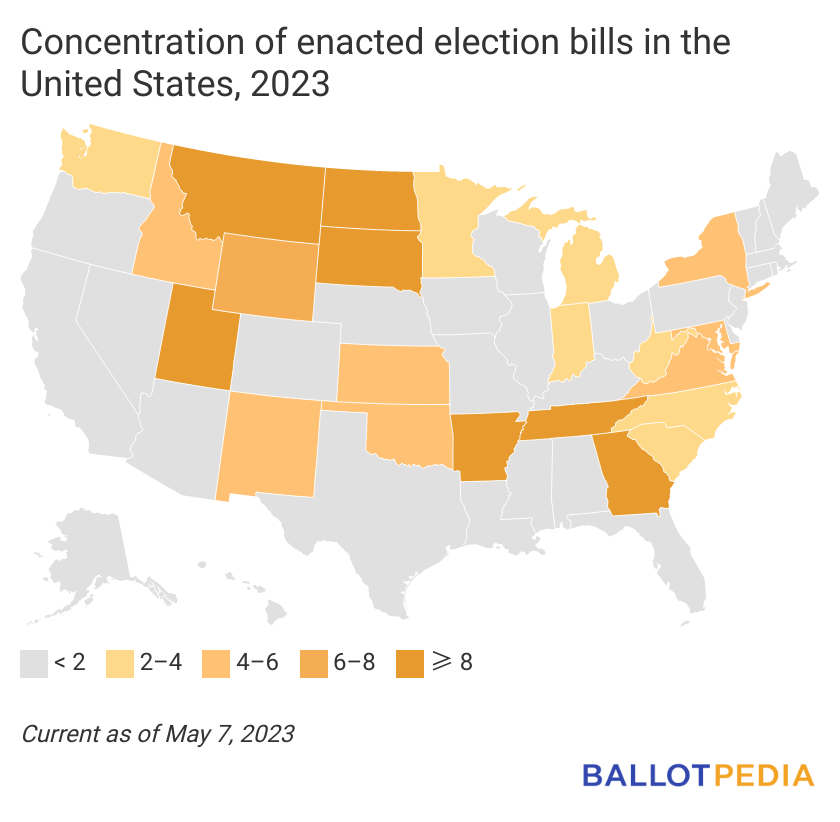As of May 7, members of the Florida State Legislature, which includes the Florida House of Representatives and the Florida State Senate, have passed seven bills related to election administration since the beginning of the year. Of those seven bills, legislators passed four during the week of May 1-7. This is four more than the same week last year. Republicans sponsored the four bills. The bills are:
-
FL H1175: Sarasota County, Reps. Fabian Basabe (R) and James Buchanan (R).
- As introduced, this bill:
- Creates the Three Rivers Stewardship District in Sarasota County, to be a single, special, limited-purpose independent special district.
- Provides that a referendum to establish the district is not required, but that the district is created instead by this act.
- Provides that the Board of Supervisors will consist of five members who serve four year terms after the initial transition period, with certain residency and citizenship requirements.
- Outlines the initial election of the Board of Supervisors, including notification requirements, and a meeting of landowners with instructions for choosing a chair, nominating candidates, quorum, and voting requirements.
- Provides that each landowner is entitled to one vote per acre of land owned in the district of each person to be elected, and that the vote may be in person, or via proxy in writing, with specific requirements and rules.
- Click the hyperlinked bill number above for more information.
- As introduced, this bill:
-
FL H1611: City of Bartow, Polk County, Reps. Fabian Basabe (R), Melony Bell (R), and Sam Killebrew (R).
- As introduced, this bill:
- Establishes an independent, special purpose, limited district called Clear Springs Stewardship District, that is subject to the City of Bartow’s comprehensive plan with certain stipulations and requirements.
- Provides that the district has certain revenue raising powers, budget preparation and approval, liens, foreclosures, use of tax deeds and tax certificates, and the ability to enter into certain contractual agreements.
- Outlines the boundaries of the district.
- Outlines the structure of the governing body; a board with five board members called supervisors.
- Establishes procedures for initial elections of supervisors, to be held after passage of the act, with certain requirements and timelines.
- Click the hyperlinked bill number above for more information.
- As introduced, this bill:
-
FL H1565: Town of Fort White, Columbia County, Rep. Robert Brannan (R).
- As amended, this bill:
- Modifies the length of the mayor’s term from three years to four years in the town of Fort White.
- Provides that members of the town council will be elected via district elections for four year terms.
- Modifies the start of term for newly elected members from 8 p.m. on the fourth Tuesday of August to the beginning of the next regular or special meeting after the election results are final.
- Codifies district boundaries for members of the town council.
- Provides that district boundaries are designed to create districts with an equal number of citizens and voters, and that districts may be changed to fulfill that purpose, with specified change requirements.
- Click the hyperlinked bill number above for more information.
- As amended, this bill:
-
FL H0945: Jupiter Inlet District, Palm Beach County, Rep. John Snyder (R).
- As introduced, this bill:
- Establishes that Jupiter Inlet District will continue to be known as such.
- Outlines the boundaries of Jupiter Inlet District.
- Provides that the district has power to enter into contracts; levy taxes on property, with certain stipulations; issue bonds, with certain stipulations; exercise eminent domain; acquire land through various methods; maintain and construct channels; construct canals, sediment basins, bridges, highways, docks, and wharves; to collect fees for use of property; to use, develop, or lease property.
- Outlines the structure of the governing body; a board with five commissioners, and clarifies that the present commissioners will continue to serve until their terms expire.
- Establishes that elections for commissioners will be nonpartisan, with numbered seats, and staggered four-year terms beginning and ending in the month of January, and that elections will be during the general election in even-numbered years.
- Click the hyperlinked bill number above for more information.
- As introduced, this bill:
Of the seven bills passed this year, one has been enacted. This is two fewer than this point a year ago. Republicans sponsored the bill. The bills is:
-
FL S0004: Statewide Prosecutor, Sen. Jonathan Martin (R).
- As amended, this bill:
- Provides that the Department of Legal Affairs in the Office of Statewide Prosecution will investigate any crime involving voting in federal, state, referendum, initiative, and issue elections, as well as any petition activities for said elections.
- Provides that the Department of Legal Affairs in the Office of Statewide Prosecution will investigate any crime involving voter registration.
- Provides that the Department of Legal Affairs in the Office of Statewide Prosecution will investigate any attempt, solicitation, or conspiracy to commit related crimes.
- Empowers the office to act in specified circumstances.
- Requires information and indictments to contain general allegations stating where the crimes are alleged to have occurred.
- As amended, this bill:
From May 1-7, legislators passed 22 bills related to election administration nationally. As of May 7, South Dakota legislators have passed the most bills this year with 18, while legislators in 19 states have passed none. The state with the most enacted bills is South Dakota with 16, while 23 states have enacted none.

The Florida State Legislature was scheduled to be in session from March 7 to May 5 this year. In 2022, Florida legislators passed four election-related bills, all in the state Senate. Three of the bills were enacted into law. Florida is a Republican trifecta, meaning Republicans control the governorship and both chambers of the state legislature.
Additional reading:
Learn More






